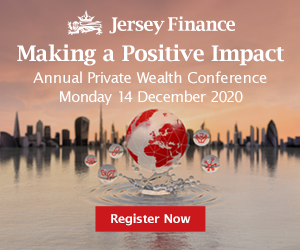Green investments and the future of sustainable finance

Sustainable finance is an area that is really picking up traction in the private wealth and investment sphere, experiencing strong growth globally. The Global Sustainable Investment Alliance estimates there are more than $30 trillion in assets that fall under “sustainable” investment strategies.
Previously, there was a unilateral assumption that sustainable investing yields lower returns, but this is no longer the case and has been strongly disproven. Environmental, social and/or governance (ESG) screening is being applied to investments worldwide and increasingly, evidence appears to validate this approach, showing that companies which score well on ESG criteria are also outperforming their competitors.
This is an area which will be discussed at Jersey Finance’s Virtual Private Wealth Conference 2020 ‘Making a Positive Impact’, on 14 December, by an expert panel of professionals in the industry. Panellists will include Andrew Mitchell, founder of Equilibrium Futures; John David, head of Rathbone Greenbank Investments, Rathbones; Alison Cambray, sustainability and climate change specialist at PwC; and Kurt Morriesen, head of sustainable investments in Europe, United Nations SDG Innovative Finance.
 The case for ESG
The case for ESG
ESG investing can be defined as investing which seeks financial return alongside positive environmental, social or governance impact. This asset class is becoming increasingly popular and is indeed holding its own against more traditional investments. A recent NASDAQ survey of the S&P 500 showed MSCI rated sustainability leaders were outperforming sustainability laggards in terms of risk management and return on invested capital.
It seems wise to take this on board as an investor or else one could quickly fall behind on what is becoming almost an expectation within the industry. In fact, MIFID II rules will soon require advisers to ask clients about their ESG preferences. These will need to be considered when assessing the range of financial products that may suit them, with fund and portfolio recommendations needing to match each client’s individual ESG preferences.
The key with ESG investing is that an investor is not just consciously avoiding perceived ‘dirty’ investments (such as those linked to tobacco, weapons, alcohol, or gambling)—this tends to be the realm of socially responsible investing (SRI). ESG offers an opt-in approach for investors, giving more flexibility as to where and why they place their capital. Sometimes this can be established by reviewing companies' material issues, which depend on their industry. What defines financially material issues can be seen in SASB's Materiality Map—things that are "reasonably likely to impact the financial condition or operating performance of a company and therefore are most important to investors". A good example of a financially material issue, which offers potential return in addition to ‘doing good’, is climate change—ultimately, global warming will substantially impact every company everywhere.
This year, as we have navigated the unprecedented upheaval of a global pandemic on the worldwide economy, ESG investments have stood the test of time and passed with flying colours. This is set to continue with major investors predicting the pandemic will accelerate this trend. A JPMorgan Asset Management poll of 50 global institutions, overseeing a total of $12.9 trillion in assets, found that 71% said an event like Covid-19 will lead to an increase in actions designed to tackle risks such as those related to climate change and biodiversity losses.
 Jersey for sustainable finance
Jersey for sustainable finance
Jersey has been active in sustainable finance for some time. Sustainable finance integrates ESG criteria into investment decisions to achieve a lasting positive impact, as well as a financial return. The sustainable finance spectrum ranges from negative screening (where the primary focus is to achieve a financial return, while also making a positive impact) to impact investing (where the primary focus is to achieve a positive impact, while also making a financial return).
From a private wealth perspective, intergenerational wealth transfers are fuelling strong growth in sustainable finance, particularly impact investing, and Jersey, as a leading international finance centre, is ready and well-positioned to accommodate this ongoing expansion, with our investment advisers and family offices developing their offerings to meet demand.
As a forward-thinking jurisdiction, Jersey is keen to encourage more sustainable finance by capitalising on its existing strengths and building on its reputation as a jurisdiction of choice for international finance. Jersey’s finance industry has a wide range of flexible structures and the knowledge and expertise to ensure investors make the right choice to suit their objectives. In addition, the Island’s flexible yet robust regulator and its expanding network of global connections are attractive for wealthy individuals wanting to make a difference with their money.
Companies and investors are placing their faith in Jersey as a base for their sustainable finance goals. Due to the highly evolved and regulated funds regime, fund sponsors wishing to raise capital for niche ideas or innovative technologies can almost certainly find a structure that suits their requirements. This flexibility has led to the setting up of several Jersey entities managing sustainably focussed investment strategies that create positive, definable social and environmental impacts.
 This year, all predictions regarding the uptick of ESG and socially responsible investment have been proven true. Of course, there are those who will continue to challenge the trend, but from an industry perspective we are working hard to ensure that investments are being made in the best interests of the communities and world in which we all live and work.
This year, all predictions regarding the uptick of ESG and socially responsible investment have been proven true. Of course, there are those who will continue to challenge the trend, but from an industry perspective we are working hard to ensure that investments are being made in the best interests of the communities and world in which we all live and work.
To hear more on this topic from an expert panel within the ESG and sustainable investment sphere, as well as a number of other panels and speakers covering ‘Making a Positive Impact’ —please visit the website to book a place: jerseyfinance.je/events






